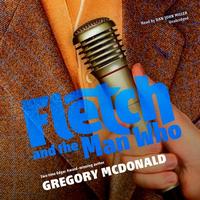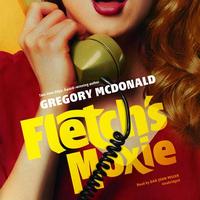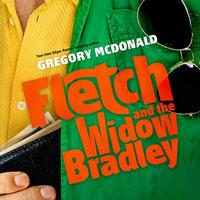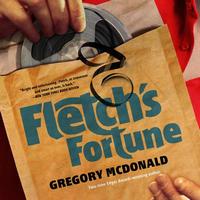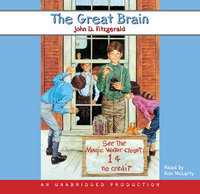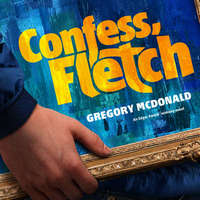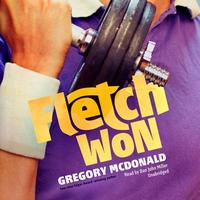 Fletch Won
Fletch Won
by Gregory McDonald, Dan John Miller (Narrator)
Series: Fletch, #8 (#1 Chronologically)
Unabridged Audiobook, 6 hrs., 30 min.
Blackstone Audio, 2018
Read: June 20 – 26, 2019

This is chronologically the first Fletch novel, he’s a rookie reporter, who’s been bounced around from headline writer, to obituaries, to wedding announcements, and is finally sent to the Society pages—with a warning. Fit in, and don’t make any trouble or he’ll be unemployed. His first assignment is to meet with an attorney, Donald Habeck, in the publisher’s office to discuss a major donation he’ll be making to a local museum and do a puff piece about it. Fletch objects, wanting to do real news—the kind of stuff he’ll later be known for. His editor (Frank Jaffe, a name known to those who’ve read Fletch and Fletch and the Widow Bradley) refuses, insisting that this is his assignment—and maybe later he’ll get a chance to do something else.
There’s a catch—Habeck is murdered in the newspaper’s parking lot on his way to this meeting. Fletch jumps on the opportunity to report on this, but the senior crime reporter shoos him off (and Jaffe). Fletch tries to exercise squatter’s rights, but no one is having any of it. Naturally, this means that Fletch will ignore this and will investigate the murder on his own—and typically is a few steps ahead of both the police and the senior crime writer.
In the meantime, he has to do his actual job (at least until he has something he can print). There’s another story they want Fletch to work on, there’s a local “escort service” parading itself as a fitness establishment—Jaffe insists that Fletch do an expose about them. To stay employed, Fletch agrees—but threatens the most detailed and explicit expense report ever. This isn’t a story that appeals to Fletch—I don’t think he cares too much if this service is just close to prostitution, or if it’s the actual thing—and he has better things to do with his time. Also, he’s about to get married, the last thing his fiancé is going to want is him hanging around a brothel all day.
The opening chapter is a hoot. As are several of the encounters Fletch has with the members of Donald Habeck’s family (particularly his wife)—and Alston Chambers never fails to be amusing. The escort service story is fun, and ends up being the kind of thing that Fletch can write about—but its main purpose is to give Mcdonald an opportunity to opine on our cultural obsession with beauty, health, and so on, while causing problems for Fletch’s personal life. There’s not a lot of meat to this story, but there’s a lot of fun. On the other hand, the murder investigation is great and vintage Fletch. It’s the best part of the book (as a mystery novel, I guess it should be, right?)
All in all, a decent Fletch novel—full of interesting characters, a nice twist, Fletch bucking all sorts of authority (police, veteran reporters, Frank Jaffee), and more than a few amusing situations. It works as an origin story, how did he become the sort of reporter we know, etc. As I mentioned earlier, we even see young Alston Chambers — just starting as an associate in a powerful law firm. But—and this is a big but— this places Fletch at the newspaper we know he ends his newspaper career with as a rookie, as a man about to be married (for the first time). We know there’s not a lot of time between the end of his first marriage and Fletch, but there’s some. Enough for a second marriage and the Window Bradley events, but not much more. What there isn’t time for is the past referred to in Confess, Fletch, Fletch’s Fortune and even hinted at in The Man Who — and the first two of those depend on Fletch’s history to work. Unless we’re to believe that his wives let him leave the state, work in a variety of other papers, developing a Fletchian reputation, move back to the same paper he started his career in (with the same senior editor), and then hit him up for alimony and still be carrying a torch for him. It stretches credulity a bit too much for me to stomach. The next book, Fletch, Too, doesn’t help things.
Does that ruin Fletch Won for me? Not totally, but that alone keeps it out of my personal top-tier Fletch novels and rank it slightly above The Widow Bradley (only for the chuckles it gives me). Clearly, McDonald isn’t as picky about this sort of thing as many of his readers are, but man, that rankles. Still, it’s fun, it features entertaining characters— some odd poetry—and enough Fletchisms to keep you happy. It’s a good time, and if you ignore what it suggests about the rest of the series, you should have a good time.
—–
![]()






